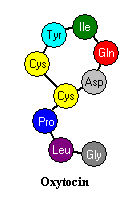Seething Heartbreak
I've written a few pieces recently about the neurohormone, Oxytocin.
 It's a remarkable neuropeptide, barely nine amino acids long, yet implicated in multiple roles from true love to mother-infant bonding and nurturing.
It's a remarkable neuropeptide, barely nine amino acids long, yet implicated in multiple roles from true love to mother-infant bonding and nurturing.
The heartbreaking stories of atrocious CIA gulags and torture camps yielded this remarkable quote from one of the torture victims, a Canadian who had been sent to Syria:
I was arrested by that expression (which is idiomatic in Arabic culture).
In Judaism, there is complex set of dietary laws called Kashrut that are observed by those who keep Kosher. The main rule is that meat and dairy are not served at the same meal.
This stricture comes from a strangely worded commandment:
Mother's milk is full of Oxytocin, the aromatic neuropeptide that warms the cockles of the heart and mediates the bond between mother and child. Oxytocin plays a signaling role in turning on the spigot for breast feeding.
Were a kid to be seethed in its mother's milk, the aromas would be apparent to the mama goat, who would be heartbroken at the news of the airborne chemical messenger.
Carnation used to advertise its brand of condensed milk as "Milk From Contented Cows." A distraught animal becomes gamey from the stress hormones released at the moment of slaughter. That's another reason that Kashrut calls for swift and humane methods of slaughter. A traumatized animal is full of stress hormones.
And a discontented mother doesn't lactate very well.
Seething a kid in its mother's milk is a surefire way to shut down the Oxytocin production, which is gonna traumatize the remaining kids in the goatyard.
And they can forget about their mother's milk.
 It's a remarkable neuropeptide, barely nine amino acids long, yet implicated in multiple roles from true love to mother-infant bonding and nurturing.
It's a remarkable neuropeptide, barely nine amino acids long, yet implicated in multiple roles from true love to mother-infant bonding and nurturing. The heartbreaking stories of atrocious CIA gulags and torture camps yielded this remarkable quote from one of the torture victims, a Canadian who had been sent to Syria:
The pain was so unbearable, he said, that "you forget the milk that you have been fed from the breast of your mother."
I was arrested by that expression (which is idiomatic in Arabic culture).
In Judaism, there is complex set of dietary laws called Kashrut that are observed by those who keep Kosher. The main rule is that meat and dairy are not served at the same meal.
This stricture comes from a strangely worded commandment:
Thou shalt not seethe a kid in its mother's milk.
Mother's milk is full of Oxytocin, the aromatic neuropeptide that warms the cockles of the heart and mediates the bond between mother and child. Oxytocin plays a signaling role in turning on the spigot for breast feeding.
Were a kid to be seethed in its mother's milk, the aromas would be apparent to the mama goat, who would be heartbroken at the news of the airborne chemical messenger.
Carnation used to advertise its brand of condensed milk as "Milk From Contented Cows." A distraught animal becomes gamey from the stress hormones released at the moment of slaughter. That's another reason that Kashrut calls for swift and humane methods of slaughter. A traumatized animal is full of stress hormones.
And a discontented mother doesn't lactate very well.
Seething a kid in its mother's milk is a surefire way to shut down the Oxytocin production, which is gonna traumatize the remaining kids in the goatyard.
And they can forget about their mother's milk.



0 Comments:
Post a Comment
<< Home